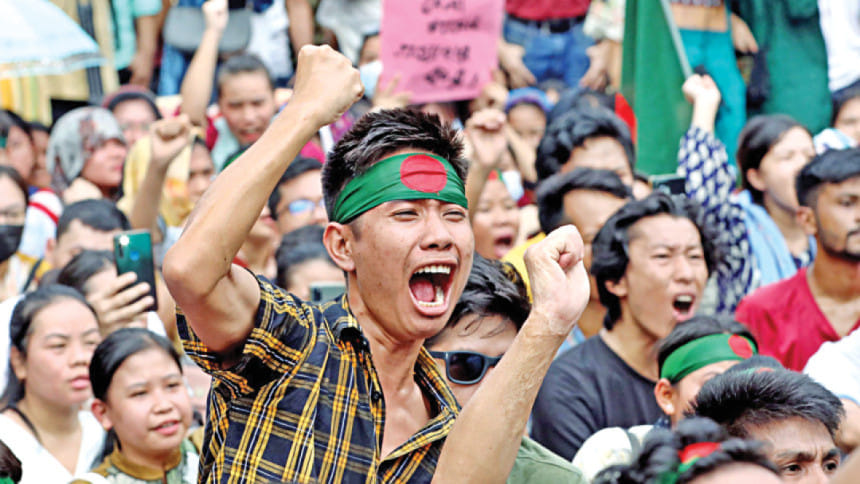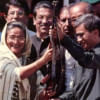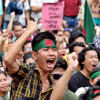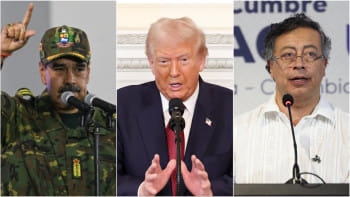Where do Indigenous peoples belong in the new Bangladesh?

Just over a year after the historic July uprising that once again split Bangladesh into a before-and-after timeline, the country finds itself at a critical juncture where we ask ourselves, "Who are we?" This search for identity in a new Bangladesh feels urgent. Yet, in this national reimagining, another pressing question remains: whose histories will be remembered, and whose will be erased?
I was reminded of this tension while facilitating a session organised by Supporting People and Rebuilding Communities (SPaRC), where 24 youth from 16 Indigenous communities came together to explore questions of culture, belonging, and power. The experience forced me to confront the privileges of my own identity as a Bangalee Muslim woman that merits its own deeper delve, but maybe another time.
What stayed with me from that day and what I want to reflect on today is a moment that cut through the abstractions of dialogue and made the stakes of belonging painfully real—one that asks that I approach this topic with as much humility as I can muster, given the privilege I hold in relation to the identities I am about to discuss.
In one of the exercises, where participants were asked to present what culture is "ours" and what is "theirs," a young Oraon man made the claim that nakshi kantha—the iconic embroidered quilt so often celebrated as "quintessentially Bangalee"—is indigenous to their community. Whether historically accurate or not, his assertion made me reflect on how the cultural fabric of Bangladesh is not uniform but rather stitched together from multiple threads, some of which have been systematically denied, an erasure that can be both cultural and material. Later that night, Coke Studio Bangla released its now-controversial song Baaji, further deepening my discomfort as discussions on cultural appropriation, tokenism, and the politics of representation emerged within activist communities.
The Oraon, Chakma, Marma, Santal, Garo, Mro, Bawm, and other Indigenous peoples carry histories older than this state. Their languages, rituals, and oral traditions have survived in the hills and plains, but in our national imagination, they are often rendered invisible, or reduced to a choreographed view comprising embroidery motifs, staged dances, or smiling faces in the tourism brochures. Culture becomes consumable for the masses while the real people disappear. The violence on lands and bodies is mirrored by the violence of forgetting.
According to a report published in The Daily Star, which quoted the Kapaeeng Foundation's 2025 report, 295 individuals were impacted by 15 land-related incidents during the first seven months of this year. These incidents included a wide range of violations—from attempted land seizures and expansion of security camps to the occupation of 130 acres of Jhum and fruit plantations belonging to 39 families, and even the seizure of a Buddhist temple site following the felling of 300 trees. In the Hill Tracts, over 27 years after the Peace Accord, militarisation continues, and promises of land restitution remain unfulfilled. In 2024, the Parbatya Chattagram Jana Samhati Samiti (PCJSS) documented over 200 human rights violations in the Chittagong Hill Tracts affecting 6,055 Jumma people, including 21 deaths, 119 houses and shops burned or looted, and 2,314 acres of land forcibly occupied, confirming that dispossession and violence remain disturbingly routine.
And as usual, women with Indigenous identities bear the brunt of this systemic aggression—through rape, intimidation, and targeted attacks that are rarely addressed. Even documentation or media coverage remains fraught and inadequate. According to a report published on Cornell University's journal Arxiv, among the 4,893 Indigenous-related news articles surveyed, 57 percent carried a negative tone—almost double that of non-Indigenous coverage—while social rights issues like education, health, and land justice were virtually ignored.
Against this backdrop, the #BawmLivesMatter movement is important because it is one that makes visible what is usually invisible. Indigenous youth took to social media after more than 100 Bawm civilians were arbitrarily detained in counterinsurgency operations against the Kuki-Chin National Front (KNF), as reported by Amnesty International. Latest reports say many of the detainees, including women and children, remain under arrest for over 500 days and counting. Their prolonged detention constitutes a disproportionately harsh and unjust response, targeting an entire community for the activities conducted by a small group.
Official documents continue to label Indigenous peoples as "ethnic minorities," thereby denying them rootedness and legitimacy. This denial is systemised. Indigenous languages disappear under the weight of Bangalee (and western) dominance; oral histories fade without institutional support; school curricula erase the stories of Indigenous resistance. What remains is often appropriated and repackaged within the national narrative to fit the sensitivities of the majority.
So, going back to my uncomfortable moment of reflection when I listened to the young Oraon man claim the nakshi kantha as theirs. Maybe his claim wasn't so much an attempt at reclaiming ownership, but an act of resistance against the machinery of cultural appropriation. Maybe it was meant to serve as a reminder that promises of equity have repeatedly excluded Indigenous peoples. That their homes were seized, their practices commodified without credit, and their demands for self-determination dismissed as threats. Maybe it was a way of insisting that their histories and identities, too often invisible, cannot simply be highlighted when convenient and ignored when inconvenient.
So, where do they fit in the changing narrative of a new Bangladesh?
Bangladesh was born out of a struggle for the right to one's own language, culture, freedom, and dignity. To deny Indigenous peoples any of these rights would be to betray the foundation of the nation. If a new Bangladesh is to emerge—one that is whole, not fractured—it must honour Indigenous belonging. That means proper land restitution, accountability for violence, and respect for Indigenous rights and identities. Otherwise, the story of this nation will remain incomplete.
Syeda Shagufe Hossain is a Canada-based Bangladeshi rights advocate.
Views expressed in this article are the authors' own.
Follow The Daily Star Opinion on Facebook for the latest opinions, commentaries and analyses by experts and professionals. To contribute your article or letter to The Daily Star Opinion, see our guidelines for submission.

 For all latest news, follow The Daily Star's Google News channel.
For all latest news, follow The Daily Star's Google News channel. 









Comments